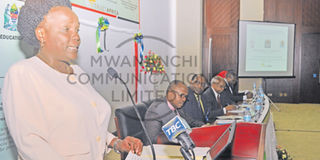Government warns it will close more universities

The Minister of Education, Science, Technology and Vocational Training, Prof Joyce Ndalichako, addresses the 2016 Higher Education Summit in Dar es Salaam yesterday. PHOTO | SAID KHAMIS
What you need to know:
- The Minister of Education, Science, Technology and Vocational Training, Prof Joyce Ndalichako, told reporters yesterday that the government was evaluating a report on universities following an inspection conducted over the past one month to verify the quality of the country’s higher learning institutions.
Dar es Salaam. The government announced yesterday that it is planning to close several higher learning institutions after a preliminary inspection report indicated that some are below standard.
The Minister of Education, Science, Technology and Vocational Training, Prof Joyce Ndalichako, told reporters yesterday that the government was evaluating a report on universities following an inspection conducted over the past one month to verify the quality of the country’s higher learning institutions.
“Already, the government has identified some that don’t have the requisite qualities to provide university education. There are those which will be barred from offering certain courses,” she said, adding: “Since the fifth government seeks to provide quality education to equip graduates with appropriate knowledge and skills that will provide the expected efficiency in workplaces, higher learning institutions is the area to which we should pay serious attention.”
Speaking at the sidelines of the Higher Education Summit 2016 which brings together actors from higher learning institutions, the government and the private sector to discuss value addition to education provided in the country, Prof Ndalichako said students from universities that will be affected by the government move will be relocated to suitable institutions.
She said the same move was taken with regard to students of Saint Joseph University students, which was closed in February because it depicted overwhelming irregularities. He warned that students should be ready for qualifying tests prior to their admission to institutions they would be transferred to.
“I am told some students transferred to the University of Dodoma (Udom) are refusing to sit for these tests. Let me take this opportunity to warn them: if they are not ready to comply with this requirement, they should simply pack their belongings and go home,” she said.
Prof Ndalichako said the country was facing a problem of poor quality of education delivered by some of the universities, saying most of the Saint Joseph students relocated to higher learning institutions were found to be too mediocre to continue with university studies.
She noted that the Higher Education Summit 2016 was set to discuss ways and means by which higher learning institutions can produce knowledgeable and skilled graduates required by the labour market in today’s Tanzania that is geared to becoming an industrial country.
“Most graduates entering the country’s employment market have been found with skills and knowledge quite below employers’ expectations and they have to be given additional training. This year’s meeting aims to find the means to provide better education that will benefit the country,” she said. The Deputy Permanent Secretary in the Ministry of Education Science and Technology, Prof Simon Msanjila, said five teams of experts conducted inspections in all higher learning institutions to identify the ones that meet the criteria set by the government.
During the four-week exercise, the inspectors checked out infrastructure, availability of lecturers as well as instructors and teaching facilities.
“Currently, we are assessing the findings from each of the five teams, and then we shall come up with one comprehensive report. The final report will establish the universities to be closed or courses that will be scrapped in certain universities,” he said.
He said it was not the first time this kind of inspection was being carried out, only that this time, the exercise was more thorough and more comprehensive.
The Tanzania Commission for Universities (TCU) board chairman, Prof Jacob Mtabaji, said TCU and universities need to evaluate themselves to ensure they offer quality education and that the business-as-usual mind set should be discarded.
“If someone wants to start a higher learning institution, they should first ensure they meet the criteria. Those who were given grace period should also abide to what they have been told,” he said.
TCU acting executive director Prof Eleuther Mwageni said they were waiting for the final report in order to enable them implement recommendations that would be provided.
“But, stakeholders are meeting here to discuss how to improve teaching techniques to enable the government implement its industrialisation strategy,” he said.
Chairman of principals and vice chancellors committee, Dr Thadeus Mkamwa, would use the two-day meeting to discuss and come up with strategic plans and modules government’s requirements are complied with.




